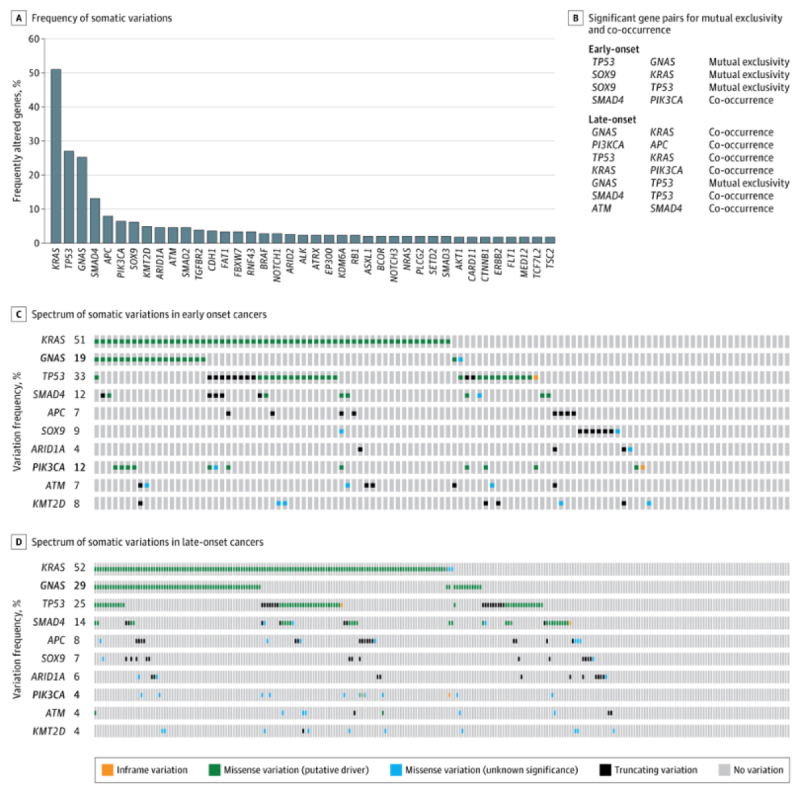Cancer of the appendix is a very rare form of cancer, having an incidence of 0.12 per 1,000,000 person-years (Siegel et al., 2020, Cancer statistics 2020 70:7-30). Incidence is rising (by 232% from 2000-2016 in the U.S.) without a known etiological basis, particularly in individuals less than 50 years old, and accordingly it has become more than a curiosity as a target for cancer research. Treatment (perhaps not surprisingly) involves surgical removal of the appendix, but typically is detected after metastatic disease has spread to other areas of the patient's body.
A recent publication in the New England Journal of Medicine, entitled "Spectrum of Somatic Cancer Gene Variations Among Adults With Appendiceal Cancer by Age at Disease Onset," by a research group from Vanderbilt, has identified an interesting pattern of genetic variants that may become a basis for differential diagnosis and screening. The study encompassed 385 patients diagnosed with appendiceal cancer, and found that patients diagnosed at less than 50 years of age showed a "unique somatic variant patterns in PIK3CA, GNAS, SMAD3, and TSC2" compared with patients diagnosed when they were older. One of these markers (GNAS) has previously been associated with overall survival rates (Ang et al., 2018, JCO Precis. Oncol. 2:1-18).
The demographics of the patients in the study were 49% men and about 28% "early onset" patients (age less than 50 at diagnosis). About 80% of the study participants were non-Hispanic whites, with African Americans comprising a larger proportion of early-onset patients (9 of 109 vs. 11 of 276). The somatic variants characteristic of early-onset patients showed "significantly higher odds of presenting with nonsilent variations in PIK3CA, SMAD3, and TSC2 (where by "nonsilent" is meant to include "missense, frameshift, nonframeshift, splicing, and nonsense variations that resulted in a change in the primary amino acid sequence of the proteins encoded by these genes). On the other hand, these patients had a 60% decreased odds of having GNAS nonsilent variations compared with patients with late-onset disease. GNAS was also investigated to show a 65% decrease in the odds of variations than late-onset cases in mucinous adenocarcinomas of the appendix (40.5% of study participants) and a 72% decrease in the odds of variation in late-onset nonmucinous appendiceal adenocarcinomas (these being different types of appendiceal cancer present in 44.4%); the remainder had appendiceal cancers of different histological antecedents. Other genes showing variation in appendiceal cancers included KRAS (51.4%); TP53 (27.2%); APC; KMT2D; SOX9; and ATM (although none of these variants showed age-of-onset correlations. And certain of these variants showed frequencies in early-onset patients that were mutually exclusive (i.e., variants were found in only one member of the pair); these included GNAS and TP53; SOX9 and KRAS; and SOX9 and TP53. These relationships and the types of variants considered in this study are shown in the following Figure:

Of these genes, somatic variants of GNAS, "a heterotrimeric G protein α subunit that activates adenylyl cyclase downstream of activated G protein–coupled receptors in response to hormones and a plethora of extracellular signals," has been detected in a variety of other gastrointestinal tumor types, including pancreas, stomach and colorectum. PIK3CA "encodes the p110 catalytic subunit of phosphatidylinositol-3-kinase (PI3K), among the key kinases in PI3K/AKT and the mammalian target of rapamycin (mTOR) (PI3K/AKT/mTOR) signaling." It is a commonly altered gene in numerous cancers, including colorectal cancer and stomach cancer. The gross statistics of variant frequency detected in this study were consistent with earlier results, but this study elucidated an age-related difference in PIK3CA somatic variation unappreciated in any earlier study. The authors also note that a PIK3CA inhibitor -- alpelisib -- has been approved for the treatment of certain advanced breast cancers, suggesting a stratagem for treatment in early-onset appendiceal cancers.
The clinical significance of the other two variants -- TSC2 and SMAD3 -- are murkier. TSC2 "is a target of RAS/ERK signaling" wherein phosphorylation of the TSC2 gene product can suppress its tumor-suppressive activity (a molecular characteristic thought to be relevant to oncogenicity and shorter disease-free survival in colon carcinomas). SMAD genes are "key mediators of transforming growth factor β (TGF-β) signals that, on inactivation, enhance tumor growth" but are infrequently associated with overall appendiceal cancers.
After acknowledging certain limitations with the tumor sources used in the study (having to do with information on "cancer stage, metastasis sites, pseudomyxoma peritonei, or tumor grade," for example), the authors conclude with the following statement:
These findings demonstrate that [appendiceal cancers, AC] diagnosed among young individuals harbor a distinct molecular phenotype compared with late-onset ACs and yield clinical actionability in future studies that should aim to elucidate distinct molecular phenotypes and mechanisms of early-onset AC and to develop and test personalized therapeutic modalities tailored to young patients diagnosed with AC.